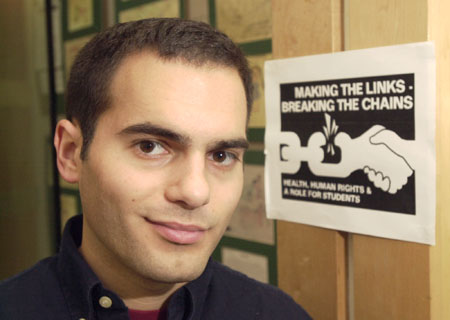Raised to be a fighter
Josh Bloom has never been shy about speaking out against injustice

“You can’t get too bogged down in some of the awful, awful atrocities that happen,” says human-rights activist Josh Bloom, 25. “You can’t try to understand torture and genocide. But there are people who are dealing with that every day.”
These issues remained predominantly in the intellectual realm for Bloom – until he found himself at the wrong end of a billy club. It was shortly after he graduated from college, and he was working in Israel, where he had also done his freshman year abroad.
“I was participating in a controversial mixed-sex prayer group on the outskirts of the Western Wall in the Old City of Jerusalem,” he says. The chief rabbi in the area decided the group was not welcome, and the worshipers were soon confronted by police in full riot gear. “We weren’t willing to move because we had every right to be there. They were physically pulling, dragging people, with their shields and their batons.” Police pursued the group until it was outside the gates of the Old City.
Though Bloom, who is receiving his degree from the School of Public Health, had been interested in human rights almost as long as he can remember, the incident marked “probably the first time in my life that I truly felt personally fully invested – that this was my struggle too, not just my struggle with somebody else. I mean, this was not a labor organizer getting death threats, but it made me understand why that person continues to speak out when there is danger involved.”
Bloom, whose M.S. is in population and international health, has never been shy about speaking out. While getting his B.A. in human development from State University of New York, Binghamton, he was volunteer coordinator for the local chapter of Habitat for Humanity; after graduating he worked in Amnesty International’s Country Specialist Coordination Program, focusing on East Asian legislative issues. And as co-chair of Harvard’s International Student Association for Health and Human Rights, he has helped to greatly increase the group’s presence on campus, advance such causes as land mine awareness and the living wage campaign, and organize talks by human-rights luminaries on topics including refugees, gun violence, AIDS, the environment, and domestic violence.
Bloom’s father, a social studies teacher, and mother, a former guidance counselor who is now a lawyer and family-court referee, “imparted very strong values of social justice, altruistic career paths, and the importance of people around the world.” For their children – Bloom has two sisters, one older, one younger – the couple served as role models, very involved in both religious life and causes such as civil rights, women’s rights, and the Soviet Jewry movement. But it was the four months Bloom spent in Belize working for Unicef that focused his life’s goals.
“The ability to work with children and develop programs that were going to lead to better health, education, and social outcomes was incredibly meaningful to me,” he says. “When I got back to the States I knew that was what I wanted to do – apply a broader perspective to my work at the grassroots level.”
Bloom recently won the Albert Schweitzer Award, which is given to graduating students whose work has been marked by a “reverence for life.”
“I don’t know of a way not to devote my life to social justice, to improve the community around me and the world in which I live,” he says. “It’s an opportunity for me to work with real heroes in the world. How often do you get to work with heroes? I’m working on behalf of modern-day Martin Luther Kings, Mahatma Gandhis, and Stephen Bikos. That’s what drives me – people who are changing the world. These are the visionaries.”




